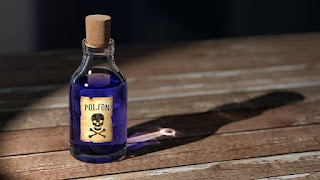Mode of Action of Poisons
Any substance (solid, liquid, or gas) that if introduced to a living body, produce ill health or death is called poison.
So, the following are the mode of action of poisons:
1. Local Action
In local action, the poison when come in contact with a particular body part then produce harmful effects at the site of contact. For eg, strong acids and alkalis cause irritation and inflammation at the site of contact.
2. Remote Action
In remote action, the poison develops toxicity at a particular designated site of action/target irrespective of the route of administration. For eg, Mercury vapors if inhaled produce neurotoxicity.
3. Remote-Local action (Systemic Action)
In systemic action, the poison produces toxic effects at the site of administration as well as at the particular target organ to develop their toxic effects. For eg, a Snakebite affects the bitten tissue as well as the central nervous system.
4. General Action
In general action, the absorbed poison evokes a response from a wide variety of tissues beyond one or two systems. Eg, Arsenic, mercury, etc.



